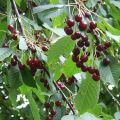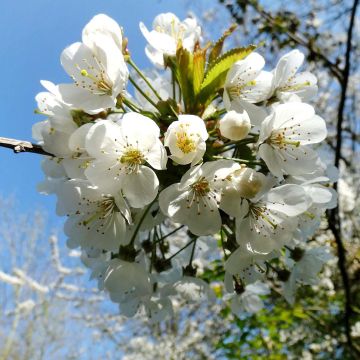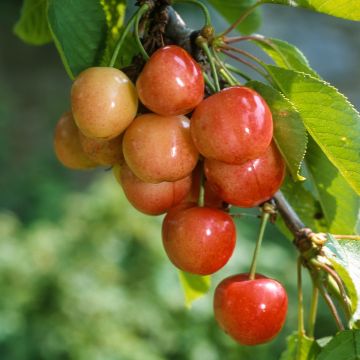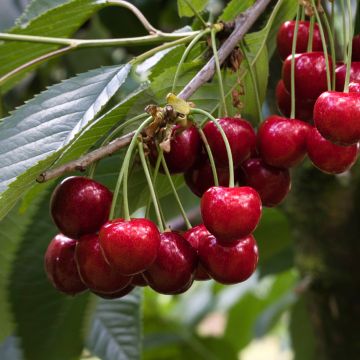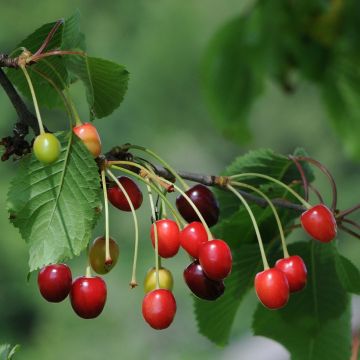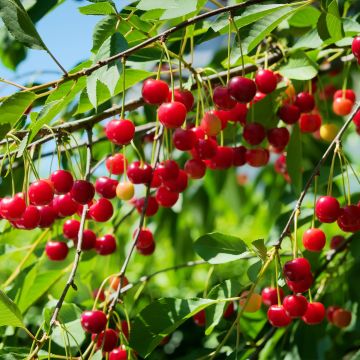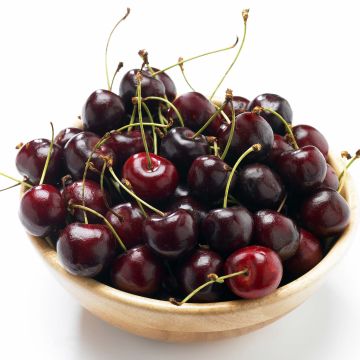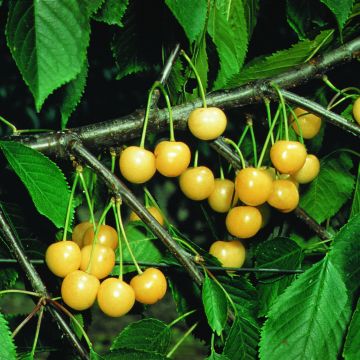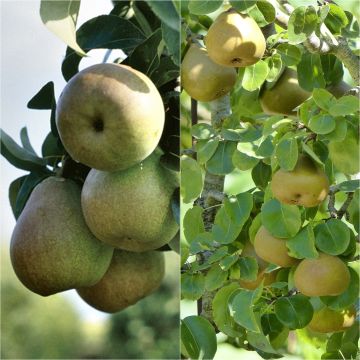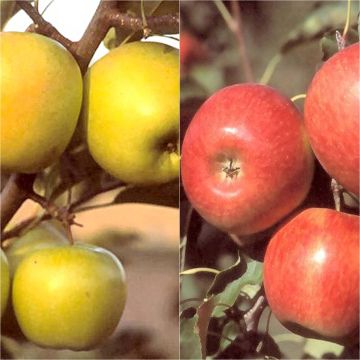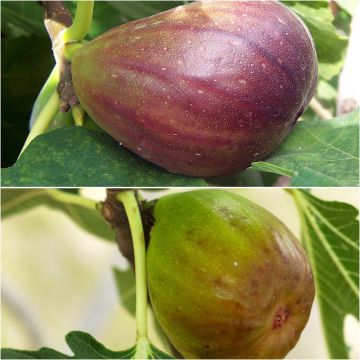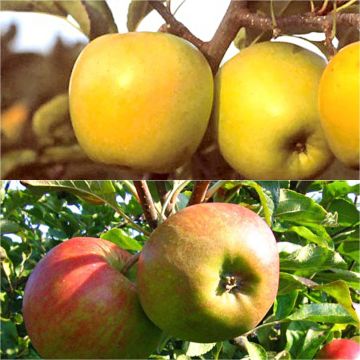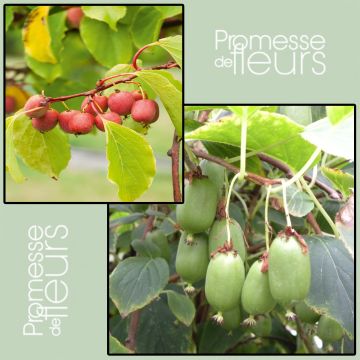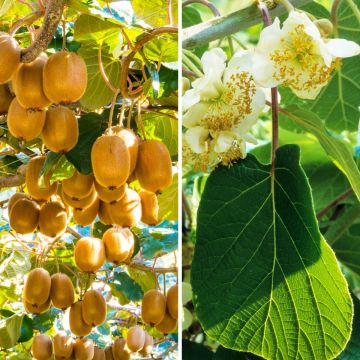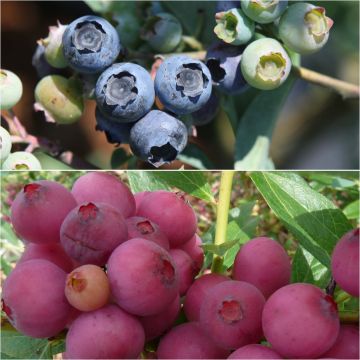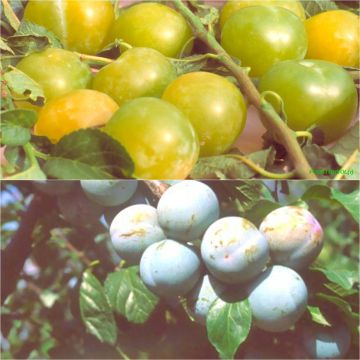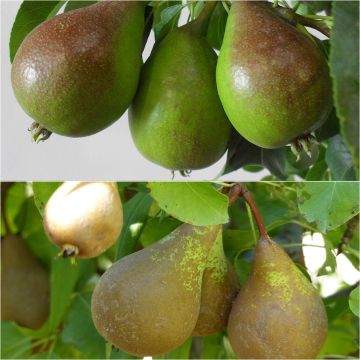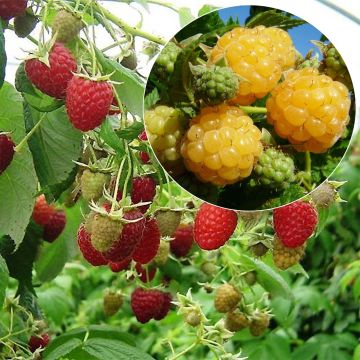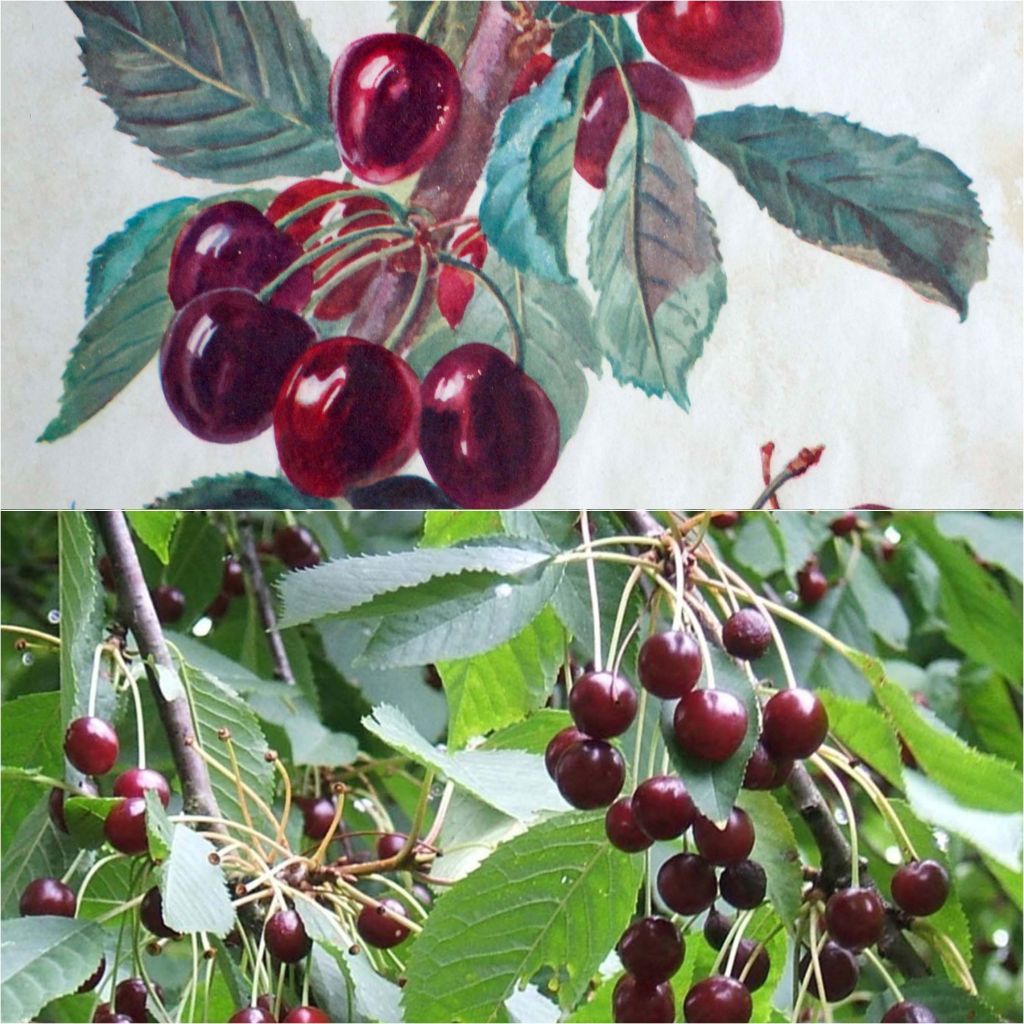

Organic bare-root sweet cherry pollinator duo
Organic bare-root sweet cherry pollinator duo
Prunus cerasus Bigarreau Marmotte, Bigarreau Moreau
This plant carries a 6 months recovery warranty
More information
We guarantee the quality of our plants for a full growing cycle, and will replace at our expense any plant that fails to recover under normal climatic and planting conditions.
From €5.90 for pickup delivery and €6.90 for home delivery
Express home delivery from €8.90.
Delivery to Corse prohibited: UE law prohibits the import of this plant from mainland France to Corse as part of the fight against Xylella fastidiosa. Please accept our sincere apologies.
More information
Collection items (2 plants)
Description
This Organic Bigarreau Cherry Pollinator Duo brings together the old varieties 'Bigarreau Marmotte', late ripening, and 'Bigarreau Moreau', early ripening. These two proven cherry trees pollinate each other, ensuring an abundant and delicious harvest, which will span from May to July. Both trees bloom in the garden between late March and early April. The cherry tree is a charming small tree, both delicious and ornamental, with few disease problems and almost no maintenance required, making it well suited for organic cultivation in a family garden. Only the fruit fly needs to be monitored: set up sticky cardboard traps or pheromone traps as soon as the cherries start to form on the tree. The cherry tree can be planted in a lawn, at the back of a border, or within an orchard. November is the most suitable month for planting a bare-root cherry tree in the garden. Plants from Organic Agriculture.
This duo consists of:
- x 1 Organic 'Bigarreau Marmotte' Cherry Tree: an early ripening variety, with cherries maturing in early summer, in June-July. The fruit is slightly elongated, of fairly large size, with a small stone and a shiny dark red skin, very appetizing and not prone to splitting. It is a juicy and sweet fruit with a slightly acidic flavor. The flavor of 'Marmotte' is unique, it is an old variety that retains its typical characteristics. The tree is very vigorous and highly productive, with a rapid start to fruiting, around 2 or 3 years. Its spring flowering is beautiful and is not out of place in an ornamental garden. Harvest the cherries at full ripeness or they may be slightly bitter. The tree reaches a height of 4 to 6 meters (13 to 20 feet) with a width of 3 to 4 meters (10 to 13 feet) at maturity.
- x 1 Organic 'Bigarreau Moreau' Cherry Tree: a variety of medium vigor, with sometimes irregular productivity. Its large heart-shaped cherries, almost black when ripe, are a delight to eat. Fairly resistant to splitting, its cherries have a firm, juicy, delicious, and sweet flesh. The tree blooms beautifully in spring, and its fruits will be harvested from late May to early June, at full ripeness. The tree has a slightly upright habit, reaching about 6m (20ft) in height and 4.50m (15ft) in width after 10 years, depending on the growing conditions. It bears fruit quite quickly, around 3 to 4 years.
Separately labeled.
The Cherry Tree, scientifically known as Prunus avium, belongs to the rose family (Rosaceae). It is a medium-sized tree, reaching 5 to 10 meters (16 to 33 feet) in height at maturity. Its rounded habit provides a beautiful shaded space, very pleasant during the summer. Its alternate and toothed leaves are shiny and dark green, turning a lovely reddish hue in autumn before falling. Cherries are rich in vitamin C, minerals, and trace elements.
Very hardy in most regions of France, the Cherry Tree is more tolerant of winter cold than summer heat. The flowers can be damaged by spring frosts, so it is recommended to plant cherry trees in a sheltered position, facing west and protected from cold winds in regions that experience fairly significant late frosts.
For transport reasons, our taller scions may be pruned before shipment. They are suitable for all common training forms: cordons, espaliers, goblets, half-standards, and low standards, except for the formation of tall standards. If you would like more information or advice on the training of your fruit trees, do not hesitate to contact us.
Report an error about the product description
Plant habit
Fruit
Flowering
Foliage
Botanical data
Prunus
cerasus
Bigarreau Marmotte, Bigarreau Moreau
Rosaceae
Cultivar or hybrid
Other Cherry trees
Planting and care
The Organic ‘Bigarreau’ Cherry Tree grows in all types of soil, acidic or limestone, fresh and light, but it is sensitive to very clayey, shallow and suffocating soils. Easy to maintain, it requires little to no pruning, although a light pruning of the tips at the end of fruiting every 3-4 years will be necessary to maintain balanced branches. Removing overlapping branches helps to maintain good tree ventilation and facilitates harvesting.
Planting period
Intended location
Care
This item has not been reviewed yet - be the first to leave a review about it.
Our fruit tree and berry bush collection
Haven't found what you were looking for?
Hardiness is the lowest winter temperature a plant can endure without suffering serious damage or even dying. However, hardiness is affected by location (a sheltered area, such as a patio), protection (winter cover) and soil type (hardiness is improved by well-drained soil).

Photo Sharing Terms & Conditions
In order to encourage gardeners to interact and share their experiences, Promesse de fleurs offers various media enabling content to be uploaded onto its Site - in particular via the ‘Photo sharing’ module.
The User agrees to refrain from:
- Posting any content that is illegal, prejudicial, insulting, racist, inciteful to hatred, revisionist, contrary to public decency, that infringes on privacy or on the privacy rights of third parties, in particular the publicity rights of persons and goods, intellectual property rights, or the right to privacy.
- Submitting content on behalf of a third party;
- Impersonate the identity of a third party and/or publish any personal information about a third party;
In general, the User undertakes to refrain from any unethical behaviour.
All Content (in particular text, comments, files, images, photos, videos, creative works, etc.), which may be subject to property or intellectual property rights, image or other private rights, shall remain the property of the User, subject to the limited rights granted by the terms of the licence granted by Promesse de fleurs as stated below. Users are at liberty to publish or not to publish such Content on the Site, notably via the ‘Photo Sharing’ facility, and accept that this Content shall be made public and freely accessible, notably on the Internet.
Users further acknowledge, undertake to have ,and guarantee that they hold all necessary rights and permissions to publish such material on the Site, in particular with regard to the legislation in force pertaining to any privacy, property, intellectual property, image, or contractual rights, or rights of any other nature. By publishing such Content on the Site, Users acknowledge accepting full liability as publishers of the Content within the meaning of the law, and grant Promesse de fleurs, free of charge, an inclusive, worldwide licence for the said Content for the entire duration of its publication, including all reproduction, representation, up/downloading, displaying, performing, transmission, and storage rights.
Users also grant permission for their name to be linked to the Content and accept that this link may not always be made available.
By engaging in posting material, Users consent to their Content becoming automatically accessible on the Internet, in particular on other sites and/or blogs and/or web pages of the Promesse de fleurs site, including in particular social pages and the Promesse de fleurs catalogue.
Users may secure the removal of entrusted content free of charge by issuing a simple request via our contact form.
The flowering period indicated on our website applies to countries and regions located in USDA zone 8 (France, the United Kingdom, Ireland, the Netherlands, etc.)
It will vary according to where you live:
- In zones 9 to 10 (Italy, Spain, Greece, etc.), flowering will occur about 2 to 4 weeks earlier.
- In zones 6 to 7 (Germany, Poland, Slovenia, and lower mountainous regions), flowering will be delayed by 2 to 3 weeks.
- In zone 5 (Central Europe, Scandinavia), blooming will be delayed by 3 to 5 weeks.
In temperate climates, pruning of spring-flowering shrubs (forsythia, spireas, etc.) should be done just after flowering.
Pruning of summer-flowering shrubs (Indian Lilac, Perovskia, etc.) can be done in winter or spring.
In cold regions as well as with frost-sensitive plants, avoid pruning too early when severe frosts may still occur.
The planting period indicated on our website applies to countries and regions located in USDA zone 8 (France, United Kingdom, Ireland, Netherlands).
It will vary according to where you live:
- In Mediterranean zones (Marseille, Madrid, Milan, etc.), autumn and winter are the best planting periods.
- In continental zones (Strasbourg, Munich, Vienna, etc.), delay planting by 2 to 3 weeks in spring and bring it forward by 2 to 4 weeks in autumn.
- In mountainous regions (the Alps, Pyrenees, Carpathians, etc.), it is best to plant in late spring (May-June) or late summer (August-September).
The harvesting period indicated on our website applies to countries and regions in USDA zone 8 (France, England, Ireland, the Netherlands).
In colder areas (Scandinavia, Poland, Austria...) fruit and vegetable harvests are likely to be delayed by 3-4 weeks.
In warmer areas (Italy, Spain, Greece, etc.), harvesting will probably take place earlier, depending on weather conditions.
The sowing periods indicated on our website apply to countries and regions within USDA Zone 8 (France, UK, Ireland, Netherlands).
In colder areas (Scandinavia, Poland, Austria...), delay any outdoor sowing by 3-4 weeks, or sow under glass.
In warmer climes (Italy, Spain, Greece, etc.), bring outdoor sowing forward by a few weeks.


































